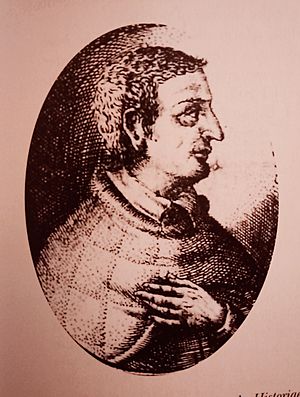Edward Wotton (zoologist) facts for kids
Edward Wotton (born 1492 – died 5 October 1555) was an English physician from Oxford. He is known for helping to start the modern study of zoology, which is the study of animals. He did this by focusing on facts and separating them from old stories or folklore.
Contents
Who Was Edward Wotton?
Edward Wotton was an important figure in the 16th century. He helped change how people studied animals. Before him, many ideas about animals were based on myths. Wotton wanted to study animals in a more scientific way.
Early Life and Education
Wotton was born in Oxford, England, in 1492. He received a good education. He studied at Corpus Christi College, Oxford. A powerful person, Bishop Fox, helped him get a special position there. This allowed Wotton to travel and study in Italy for three years.
Studying Medicine in Italy
While in Italy, Edward Wotton attended the University of Padua. He focused on studying medicine, which was called "physic" back then. He worked hard and earned his degree as a doctor. This training helped him become a skilled physician.
His Work as a Physician
After returning to England, Wotton became a respected doctor. On February 8, 1528, he became a member of the Royal College of Physicians. This was a very important group for doctors in England.
Serving Important People
Even though some people thought he was the doctor for King Henry VIII, he actually worked for other important people. He served the Duke of Norfolk. He also worked for Margaret Pole, Countess of Salisbury. In 1555, he was a fellow "censor" with another doctor named Alban Hill. A censor was a person who checked on the quality of medical practice.
Contributions to Zoology
Edward Wotton's biggest contribution was to the study of animals. He believed in studying animals carefully, much like the ancient Greek thinker Aristotle. He wanted to record what was true, not just what people imagined.
His Main Book: De differentiis animalium
Wotton collected his detailed research into a book called De differentiis animalium libri decem. This means "Ten Books on the Differences of Animals." It was published in Paris in 1552. This book was very important because it helped create a more factual way to study animals.
The Theatre of Insects
Wotton also worked on another important book about insects. It was called Theatre of Insects. However, this book was not published until much later, in 1634. It was edited and completed by another scholar, Thomas Muffet.
Legacy
Edward Wotton died on October 5, 1555. His work helped set the stage for modern zoology. He showed that studying animals should be based on careful observation and facts, not just old stories or myths. His books were a big step forward in understanding the natural world.
 | Frances Mary Albrier |
 | Whitney Young |
 | Muhammad Ali |


